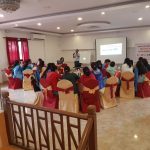Birthrights, a national charity for the rights of women during pregnancy and childbirth has today launched the interim report of a study undertaken by staff from Bournemouth University and the University of Liverpool, about the experiences of disabled women during pregnancy, childbirth and early parenting.
The current work arises following their 2013 Dignity in Childbirth survey which highlighted less positive experiences of women who identified themselves as disabled (Birthrights 2013). In response, Birthrights commissioned research to explore the experiences of disabled women throughout pregnancy, childbirth and the first few post-natal weeks (the pregnancy continuum). A multidisciplinary team, comprising of Dr Jenny Hall, Jilly Ireland and Professor Vanora Hundley from CMMPH and Dr Bethan Collins from the University of Liverpool, have just completed the first phase of the study, which has been released by Birthrights as an interim report today. This first phase of the study used an online survey to identify experiences of women in the UK and Ireland with physical or sensory impairment or long term health conditions during the pregnancy continuum.
Although overall satisfaction with services in general was scored highly by most women, challenges were described in women’s experiences. These included lack of continuity of carer, meaning that women needed to repeat their information again and again; women feeling that they were not being listened to, which reduced their feeling of choice and control; feeling they were treated less favourably because of their disability. More than half of the women (56%) felt that maternity care providers did not have appropriate attitudes to disability. Accessibility of services was also highlighted as poor, in some situations.
These findings resonate with recommendations from the recent maternity services review (National Maternity review 2016), which highlights the importance of personalised care, that is woman-centred, with opportunity for choice and control, and continuity of carer for everyone. The current study highlights how imperative this approach is for disabled women.
A follow-up qualitative study is underway to establish in-depth views and experiences of human rights and dignity of disabled women during the pregnancy continuum to develop our understanding of how best to enable this group. This second phase is due to be completed in Spring 2017.
The Interim report outlining the results from phase 1 is released today by Birthrights and may be found on the CMMPH web site.
https://research.bournemouth.ac.uk/wp-content/uploads/2013/10/Interim-Report-Sept16.pdf
 CMMPH disability & childbirth research
CMMPH disability & childbirth research Top three most accessed 2016 paper BMC Pregnancy & Childbirth
Top three most accessed 2016 paper BMC Pregnancy & Childbirth










 Up2U: New BU academic publication
Up2U: New BU academic publication New BU midwifery paper
New BU midwifery paper BU academic publishes in online newspaper in Nepal
BU academic publishes in online newspaper in Nepal Final day of the ESRC Festival of Social Science
Final day of the ESRC Festival of Social Science Using Art to enhance Research
Using Art to enhance Research ECR Funding Open Call: Research Culture & Community Grant – Application Deadline Friday 12 December
ECR Funding Open Call: Research Culture & Community Grant – Application Deadline Friday 12 December MSCA Postdoctoral Fellowships 2025 Call
MSCA Postdoctoral Fellowships 2025 Call ERC Advanced Grant 2025 Webinar
ERC Advanced Grant 2025 Webinar Horizon Europe Work Programme 2025 Published
Horizon Europe Work Programme 2025 Published Horizon Europe 2025 Work Programme pre-Published
Horizon Europe 2025 Work Programme pre-Published Update on UKRO services
Update on UKRO services European research project exploring use of ‘virtual twins’ to better manage metabolic associated fatty liver disease
European research project exploring use of ‘virtual twins’ to better manage metabolic associated fatty liver disease